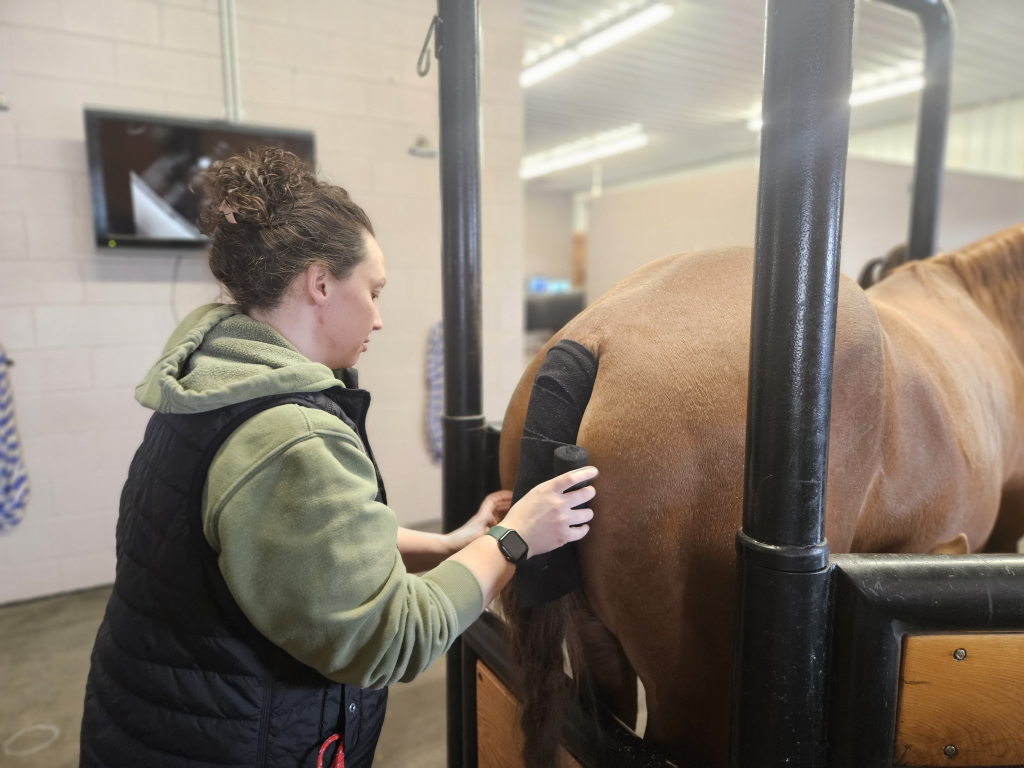Mares
Artificial Insemination | Breeding Soundness Exam | Fetal Sexing | Hysteroscopy
Saginaw Valley Equine Clinic strives to provide each client and each mare an individualized assessment and breeding plan to help reach our mutual goal of a successful pregnancy.
Our veterinarians are up-to-date on the most relevant techniques and research to provide clients with expert advice.
Generally, mares should be in good health prior to breeding as well as up to date on vaccinations, deworming, and dental care. When planning whether to breed or not, a complete evaluation of the mare is recommended, including, if necessary, testing for heritable diseases such as HYPP, HERDA, WFFS, and OLWS. Mares are seasonal breeders, which means that they will stop cycling (enter winter anestrus) from late fall to late spring. To hasten the onset of cyclity they can be placed “under lights” 60 days before the anticipated breeding date. Placing a mare under lights means exposing her to 16 hours of daylight per day. This can be accomplished by using barn or paddock lights with timers, or a blue light emitting mask.
When a mare presents to SVEC for breeding, transrectal palpation and ultrasonography are performed to evaluate her internal and external reproductive anatomy. If there is any question or abnormal fertility history, further evaluations such as a vaginal examination, uterine culture with cytology, or endometrial biopsy may be recommended.
Artificial insemination involves monitoring a mare until she is in estrus with a dominant ovarian follicle (containing an egg), then giving an ovulation induction agent once the timing of the semen shipment has been coordinated and confirmed. Insemination is targeted within 6-24 hours of ovulation depending on the semen type (fresh versus cooled versus frozen) and quality. Ovulation is confirmed and the mare is checked for post-breeding inflammation (endometritis). Pregnancy detection can be done as early as 14 days post-ovulation.
A breeding soundness examination allows the veterinarian and owner to evaluate a mare’s fertility and give a percentage chance of her becoming pregnant and carrying the foal to term. A complete Breeding Soundness Examination (BSE) involves an external genitalia conformation examination, transrectal palpation and ultrasonography, vaginoscopy, uterine culture, cytology, and biopsy. The information obtained is used to grade the endometrium on a score of grade I, IIA, IIB, or III, each with a corresponding fertility percentage. A breeding soundness examination does not take into account a mare’s overall health concerns or oviductal pathology.
Hysteroscopy involves placing an endoscopy into the uterus via the cervix to evaluate the uterine, cervical, and oviductal openings. The veterinarian passes a sterile endoscope into the uterus through the cervix and then the uterus is dilated with sterile air. It can then be explored from tip to tip and samples taken as needed. While in the endometrium, a laser can be used to burn off any cysts that may be affecting a mare’s ability to become pregnant. In addition, foreign bodies such as marbles, uterine culture swabs, or fetal bones can be removed if identified.
Fetal sexing is the determination by a veterinarian of a fetus’ sex while in utero. This can be accomplished between days 61 -67 (transrectal). These tight windows allow the veterinarian to visualize the fetus in utero as well as the male or female reproductive organs. Our veterinarians are about 90% accurate.

Benefits include:
- Full-service facility with comfortable stabling to allow mares (and foals) to relax
- All semen requests are coordinated through SVEC
- After-hours staff available for late-night shipments or frozen semen insemination
- Climate controlled and light controlled facility to optimize cyclicity
- Regular daily turnout to encourage better health



